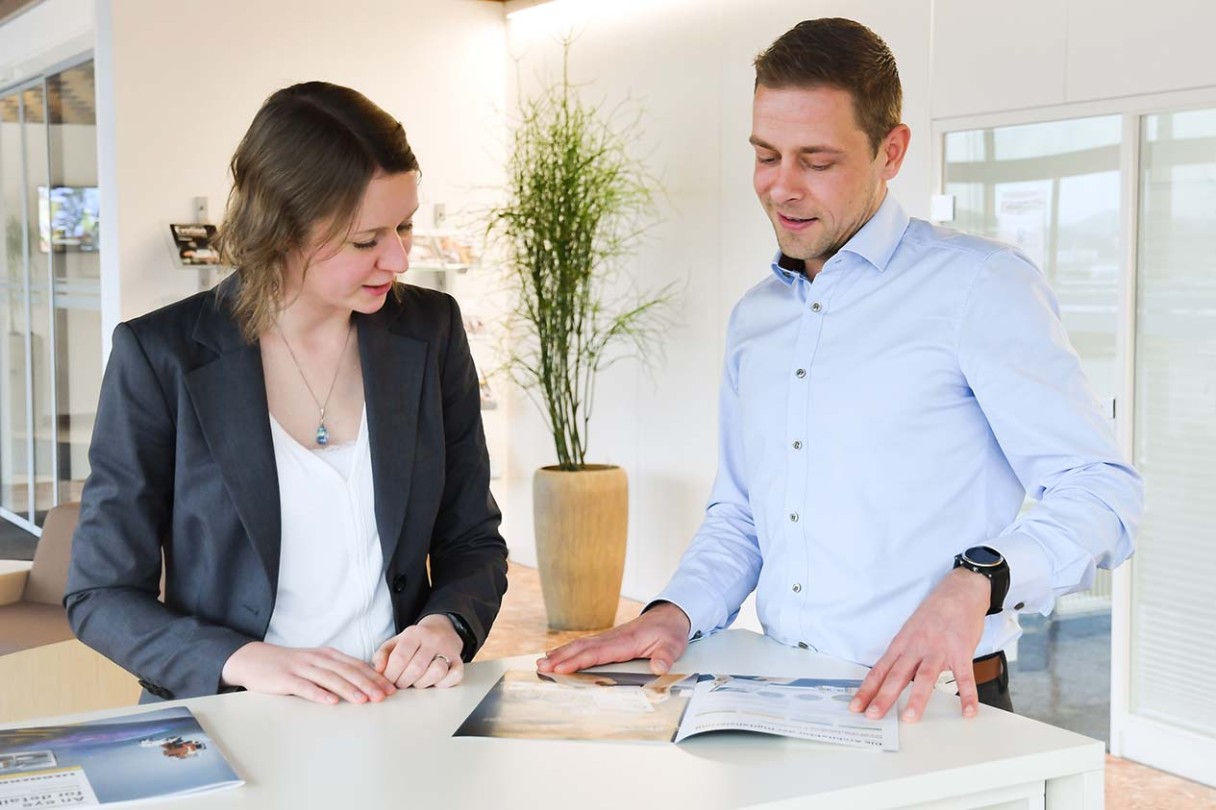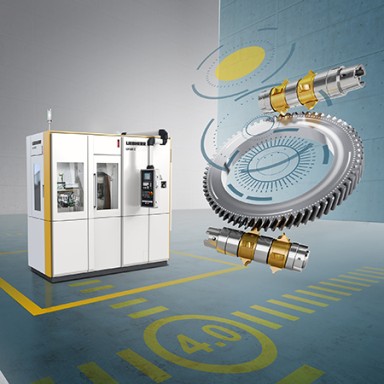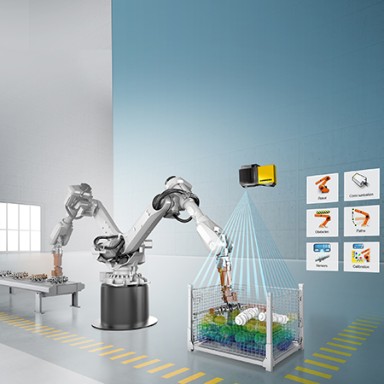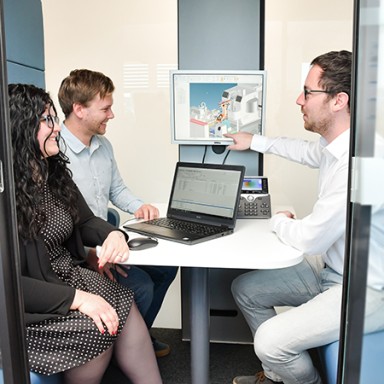A conversation with Agnes Schauppel and Martin Schwarzmann, Product Management: the company's clairvoyants
Martin Schwarzmann has been working as a product manager for the gear technology division since 2015. He previously completed an apprenticeship as an industrial mechanic and then studied industrial engineering at the University of Applied Sciences in Kempten while already working at Liebherr-Verzahntechnik GmbH as a student trainee. Agnes Schauppel, product manager for automation systems, also attended the same course of study. But this was not before discovering her passion for technology and her desire for creative and varied work during her training as a technical draftswoman.
But does product management offer this desired variety? What are the challenges you have to deal with in this field? And what future developments can Agnes and Martin see in their crystal balls in the field of gear technology and automation? We'll give you the answers in the interview.
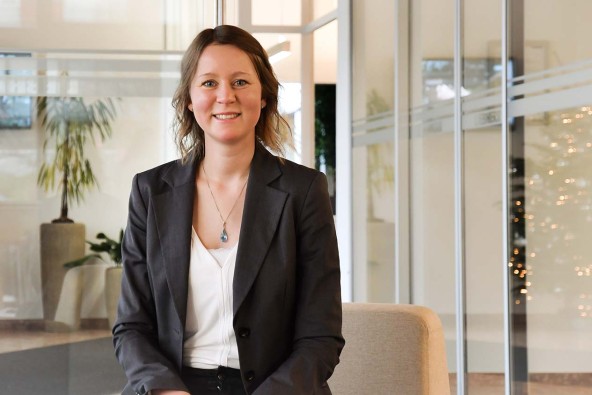
Agnes Schauppel, product manager automation systems
You both work in product management at Liebherr-Verzahntechnik GmbH. What does the work of a product manager look like?
Agnes: In short, we are at the product's side throughout its entire life cycle. From market observation and product and portfolio strategy through to product development and product maintenance.
As a first step, market observation is essential. Whether in discussions with customers, at trade conferences or through online media, we need to have our finger on the pulse and, by gathering information, anticipate where the market is heading and what products will be needed in the near and distant future. It is important to be able to read between the lines. The customer doesn't usually tell us outright: “I need product XY”. They often don't even know yet. During the conversation, we find out what exactly is bothering them and then the cogs in our brains begin turning. Can our existing products handle the tasks, or do they need to be adapted? Do completely new products have to be developed? The great thing about this is that, for us, every problem represents the potential from which a new product might emerge.
Our findings then flow into the product and portfolio strategy. In other words, we plan where products need to go based on long-term trends, how the products in our range harmonize with each other and which market segments are served.
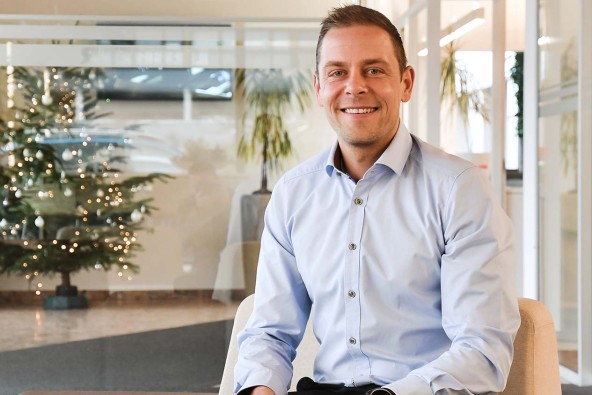
Martin Schwarzmann, product manager gear technology
Martin: That's when the excitement starts – with product development. We support our colleagues in this, providing ongoing input and ensuring we don't develop beyond the requirements of the market and the customers. This isn't always straightforward. We often have to question ourselves to see if our original assumptions still hold true. Market situations change and we often find ourselves faced with unexpected tasks and challenges. But that is precisely what we are passionate about in product management. It is fast-paced, unpredictable and challenging.
And last, but by no means least, comes product maintenance. When you launch a product, the work doesn't end there – we continue to look after it. We monitor customer reactions, we look at whether new requirements are arising for the product and whether add-ons have to be created, we keep an eye on costs and take care of product marketing.
If we already knew for sure which topics and trends would play a role in the market in the future and what the competition is doing, our job would be really easy. However, we would then also be superfluous.
What is the biggest challenge in product management?
Agnes: Definitely the lack of a crystal ball. If we already knew for sure which topics and trends would play a role in the market in the future and what the competition is doing, our job would be really easy. However, we would then also be superfluous. So, the challenge is to observe closely and draw the right conclusions. As already mentioned, assumptions have to be scrutinized again and again and revised if necessary.
Martin: We offer very technical products and are also in part strongly driven by project business. We often have special customer requirements that are not very homogeneous across industries. It is therefore very difficult to respond to individual needs and to initiate the right innovations.
Which topics are particularly preoccupying gear technology and automation at the moment?
Martin: In gear technology, the topic of e-mobility brings with it increased requirements when it comes to the accuracy of gears. This is because the electric motor is quieter and therefore no unwanted noise must be generated in the gearbox. Tolerances are also becoming smaller and smaller in aviation. Technologies such as chamfering and generating grinding play a major role here. For this, we have to develop machines that offer increased quality, productivity and process stability.
With some technologies, we have already pushed this as far as the physical limits will allow. Faster and more precise is no longer an option. It's more a question of what else happens around the machine. Keyword: digitalization.
With our LHWebPlatform, customers can, for instance, monitor their machine, transmit and visualize signals, and transmit preconfigured reports that provide information on, for example, capacity utilization and errors. This information can then be used to further optimize production and minimize downtime and failures.
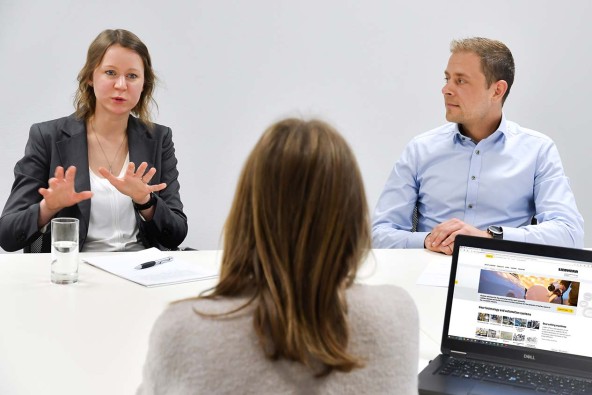
Agnes: I observe this in automation as well. A prevalent issue is a lack of resources. Whether that's personnel, time or materials. Automation is needed in order to get the most out of production and to produce with as few resources as possible.
The quality of the systems and the technical competence are still important. But the potential for optimization lies strongly in digital products. We need user-friendly software that makes it easy to operate the systems – especially given the shortage of skilled workers – and that provides information on how to produce even more efficiently. The topic of artificial intelligence (AI) also plays a role here. Imagine, for instance, if an automation system could optimize itself? The AI regularly recognizes a bottleneck at 7:30 a.m., before the operator has arrived, and sends the information: We need an operator to be here by 7:00 a.m. to avoid this standstill.
The topic of e-mobility is important in automation too. A large proportion of our customers come from the automotive industry, which is why we have been working on the development of solutions for battery pack assembly for some time. (Read more in the interview with Stefan Jehle)
And how do you think the market will develop? Which topics will become important in the next few years?
Agnes: One trend that already exists, but which I think will grow, is “automation for everyone”. There will be even more automation. In the future, a cobot will probably be used in every logistics operation and employees will know how to handle the robot. Approaches such as no-code or low-code will play a role here. The user interface will have to be intuitive and usable without programming knowledge. This will also help with the shortage of skilled workers. Dealing with automation will become a matter of course.
Martin: Sustainability is currently a hot topic that will become even more important. In order to reduce energy costs and produce in a more environmentally friendly manner, machines must be developed in a compact and efficient way. This applies throughout the entire product life cycle. For example, with our Reman program, we bring old machines up to the latest state of the art, replace the old components with newer and more efficient ones, and then return them to the cycle.
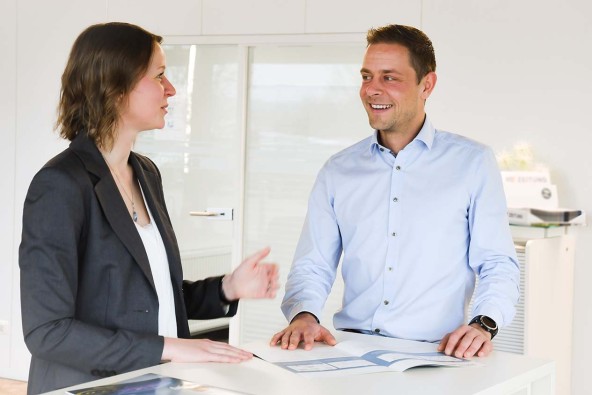
What has been your biggest highlight so far during your time at Liebherr?
Martin: What I enjoy most are product launches. It's impossible to name a single highlight because I've been able to work on so many great products. It's a great feeling after the development period, which sometimes lasts two years, to see the result of your hard work. You look forward to the moment when you can show it to the customer and get their initial feedback. Like this year, when we presented our new LC 500 DC gear hobbing machine at the AMB in Stuttgart. The best thing is when you achieve the desired “Aha!” moment for the customer and we have our assumptions about market demand confirmed.
Agnes: I like to analyze and love developing strategies. That's why I find the shift from combustion engine to electric motor particularly exciting. A lot is happening in our portfolio. Existing things must be re-envisaged, turned upside down and reorganized. As part of this, we have also introduced innovation management in the company, where every employee can submit ideas. It's fun to see people's creativity and to then assess what might develop into a business case. Ultimately, our strategy emerges. This will indicate the direction we're going to take over the next few years, and I'm right in the thick of it.
What makes working at Liebherr special for you?
Agnes: You can feel the enthusiasm for technology. On my first day at Liebherr, my head was already spinning after the first few hours because I felt I'd heard about more technology than I had in half my studies. Everyone here is a full-blooded technician and has a great technical focus. That makes it challenging, but all the more exciting.
Martin: I totally agree. No matter who you talk to – in manufacturing, design – it's like the passion for technology is in the air at Liebherr.
As far as product management is concerned, you notice that we are taken seriously and that a lot of trust is placed in us. The general managers take notice of what we have to say and we are given the necessary creative freedom. In general, interactions in the company take place on an equal footing and in a very informal atmosphere. You can also feel the Liebherr family in the company.
Agnes: That's true. When we meet members of the Liebherr family, they come to talk to us and are genuinely interested in our assessments and opinions of the market. This makes us feel appreciated. It's also where the trust and freedom in our Liebherr company emanate from. What is exemplified by the family is then reflected in the management of the companies.
